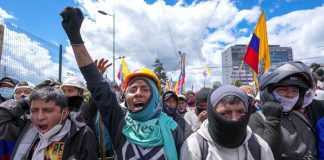The Sri Lankan army has now completed its brutal conquest of the areas of the island previously controlled by the Tamil Tigers. In the process the military hemmed hundreds of thousands of Tamil civilians into a strip of coastal land, the Jaffna Peninsula.
The Sri Lankan army has been responsible for more than 20,000 civilian casualties in Tamil areas in the last few months. Civilian hospitals have repeatedly been bombed by government troops, sometimes minutes after the Red Cross passed on their co-ordinates to prevent them being fired on, according to The Times.
Journalists were banned from the war zone by the government, making it difficult to find out what the army has really been up to.
Although the defeat of the Tigers has brought the fighting to an end, there is little prospect for ongoing peace.
The Tamil refugees recently seen “escaping” from Tiger controlled areas in news footage are now most likely to be in “resettlement camps” set up by the viciously anti-Tamil government.
There are reports of kidnappings and killings of Tamil civilians to ethnically cleanse areas, where the government is now encouraging ethnic Sinhalese to resettle.
Shipped
The crushing of the Tigers brings to an end the conflict that began when they launched a military uprising in 1983. But Tamil separatism was a response to decades of discrimination and pogroms orchestrated by rulers from among the Sinhalese majority.
Sri Lankan Tamils, who make up around 14 per cent of the population, have lived on the island for more than 1000 years.
The British helped to lay the foundations for today’s conflict by using divide and rule tactics to secure colonial control.
They favoured the Tamil minority in order to encourage their loyalty giving them preferences for government jobs and university places.
But after Ceylon obtained its freedom from the British Empire in 1948 the new government began a series of attacks on Tamils.
It moved to replace English as the official language with Sinhalese in a covert attack on the Sri Lankan Tamil middle class, who generally spoke English and Tamil.
Hundreds of thousands of Indian Tamils, who had been brought to the country to work on tea plantations a century earlier back to India, were either deported or stripped of their right to vote.
There were widespread anti-Tamil riots in 1958. Three years later, during a general strike by Tamils against discrimination, the government declared a state of emergency and sent troops into the Tamil heartlands in the central highlands and the north of the island.
The left in Sri Lanka should have been able to undercut the wave of ethnic tension unleashed by the government.
The strongest socialist party on the island, the Lanka Sama Samaja Party (LSSP), was a Trotskyist party with a mass membership among all linguistic groups. For a time it was the country’s main opposition party.
But rather that appealing to working class unity, the LSSP, together with the Communist Party, joined the government and declared itself to be the authentic voice of nationalism.
In the 1970s younger Tamils, angered by the lack of change and the compromises made by their mainstream parties, started to take up arms against the state.
They formed a variety of groups, the Tamil Tigers chief among them, to demand a separate state in the north of the island. Within a few years they controlled much of the territory.
Sri Lankan authorities launched a crackdown in which thousands of Tamils were jailed and tortured. The Tigers responded with kidnappings and bombings. So began a spiral of violence that engulfed much of the country.
Rebellion
Having neither mass support across the country nor enough firepower to defeat the state, the Tigers looked to India for backing. But the Indian state was to play a duplicitous role.
Having initially helped to arm the Tigers from bases in the Indian city of Madras, the Indian government later helped broker a peace deal that involved the sending of 75,000 “peacekeeping” troops to the island.
The military defeat of the Tigers, far from bring a new era of peace and prosperity, looks certain to usher in a new era of attacks on the working class.
The government was recently forced to turn to the International Monetary Fund for a £1.3 billion loan, which is demanding austerity measures and privatisation in return.
We should demand that our government condemns the military action and pressures Sri Lanka to end its discrimination against Tamils.
But only a movement inside Sri Lanka that is prepared to challenge the discrimination of the state, and the culture of chauvinism that has been encouraged by it, is capable of winning this struggle.
Socialist Worker UK





